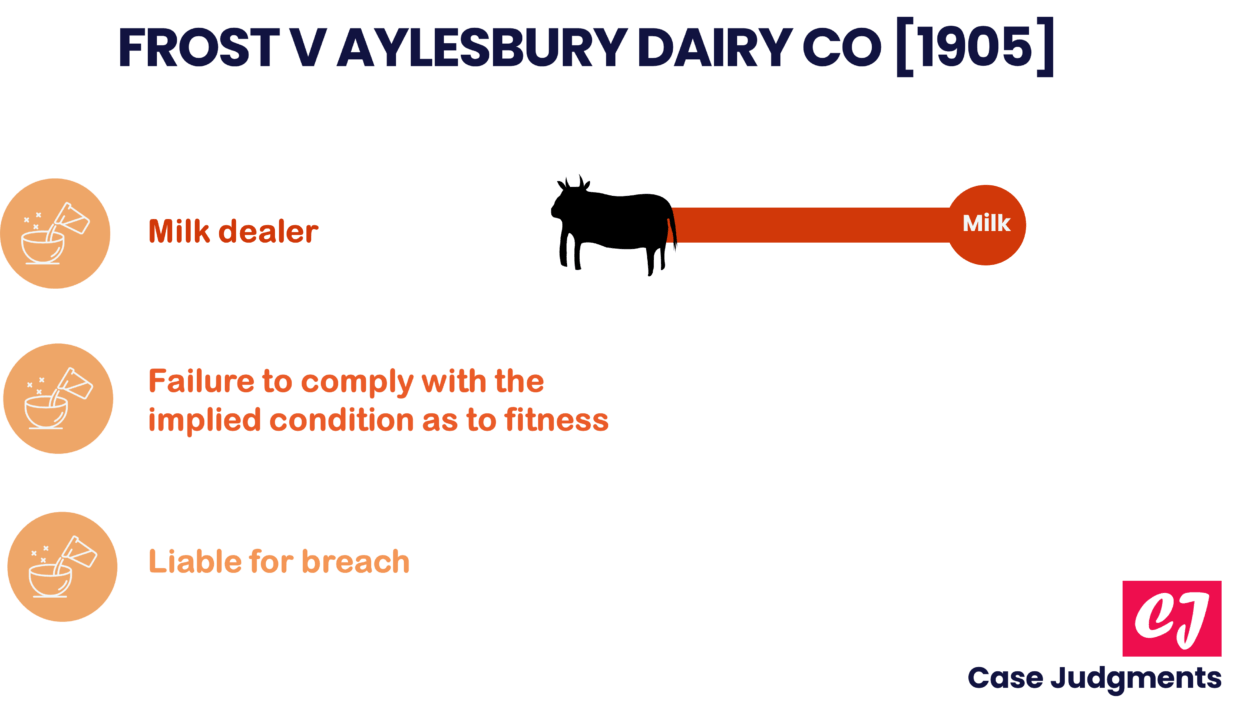
A Summary of Frost v Aylesbury Dairy Co [1905]
Case name & citation: Frost v Aylesbury Dairy Co [1905] 1 KB 608
Court and jurisdiction: Court of Appeal, England and Wales
Year of the case: 1905
Area of law: Implied Term as to fitness for a particular purpose
What is the case about?
Frost v Aylesbury Dairy Co is a UK case that showed that “goods in their natural state” must comply with the requirement of fitness for purpose in accordance with Section 14(3) of the Sale of Goods Act 1979.
Facts of the case (Frost v Aylesbury Dairy Co)
The plaintiff bought milk from a milk dealer for the consumption of his own family. As a result of the typhoid germs that were present in the milk, the plaintiff’s wife became sick and passed away.
An action was brought against the seller.
The decision of the Court in Frost v Aylesbury Dairy Co
In this situation, the purpose for which the milk was going to be used was, by implication, made known to the seller. As a result of the milk’s unsuitability for consumption by humans, the defendant was found to be in violation of an implied condition, which resulted in the defendant being held liable.
Despite the fact that the goods had not undergone a manufacturing process, the seller had a duty to select his stock with the necessary level of skill and care and it was not unreasonable for the buyer to rely on the skill or judgment of the seller. There was an implied term that the goods supplied were fit for their purpose as per Section 14(3).
Since the milk was not fit for consumption, the English Court of Appeal held that the seller was in breach of Section 14(1) of the Sale of Goods Act 1893 [equivalent to Section 14(3) of the Sale of Goods Act 1979].
Strict liability
It is important to point out that the seller’s liability in this scenario was deemed to be strict. Taking into account the level of medical knowledge that existed at the time, the dairy company could not have identified these germs regardless of how much skill or care they had applied, but they were still held liable.
What is the general rule for “Goods in their natural state”?
If the sale involves goods that are still in their natural state and have not been subjected to any kind of manufacturing process, the buyer is still permitted to presume that the goods meet the requirement of satisfactory quality in relation to Section 14(2), and he is able to rely on the seller’s skill and expertise in selecting such items in terms of Section 14(3).
List of references:
- http://law.uok.edu.in/Files/5ce6c765-c013-446c-b6ac-b9de496f8751/Custom/Conditions_and_Warranties.pdf
- https://s3-eu-west-2.amazonaws.com/lawcom-prod-storage-11jsxou24uy7q/uploads/2016/08/No.071-Law-of-Contract-Implied-terms-in-Contracts-for-the-Supply-of-Goods.pdf
- https://www.hoddereducation.co.uk/media/Documents/Scottish/QR-4-1.pdf
You might also like:
More from sale of goods:

